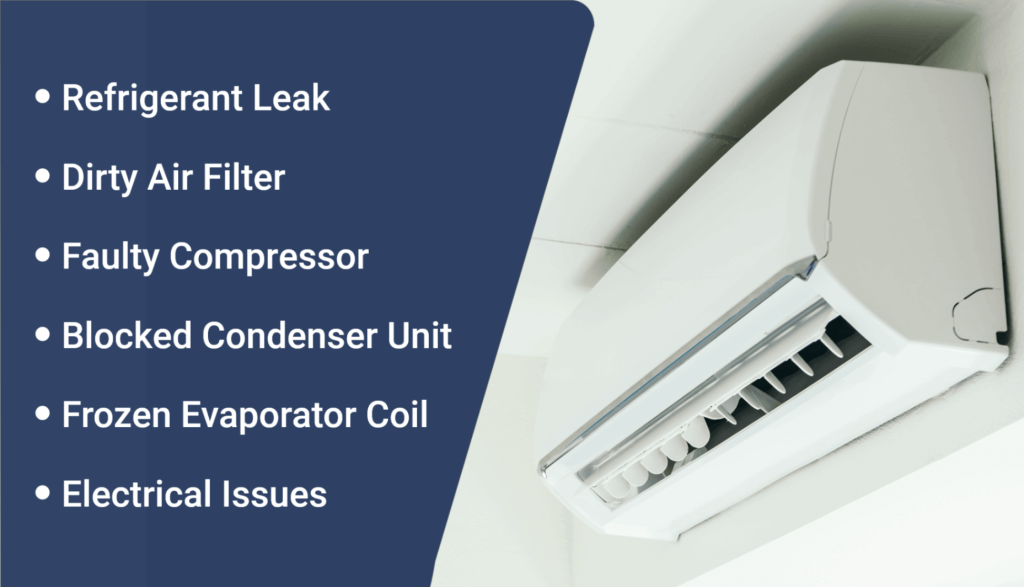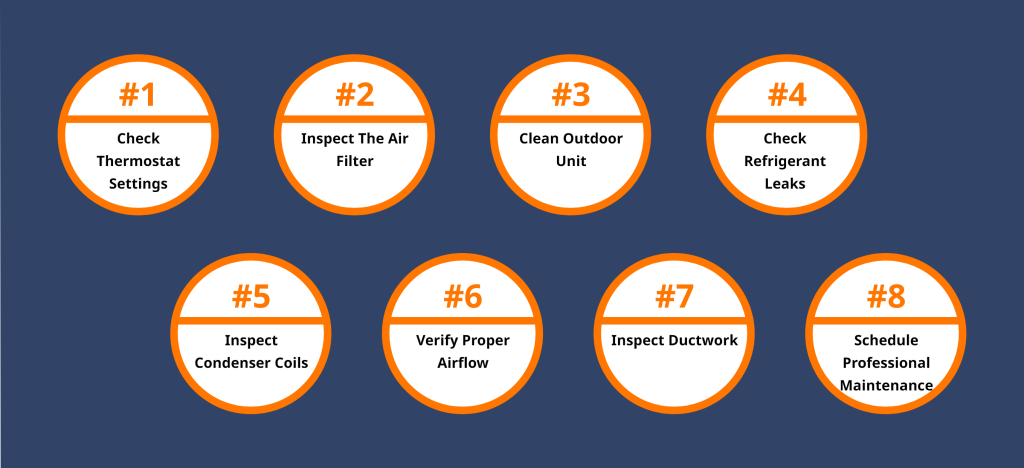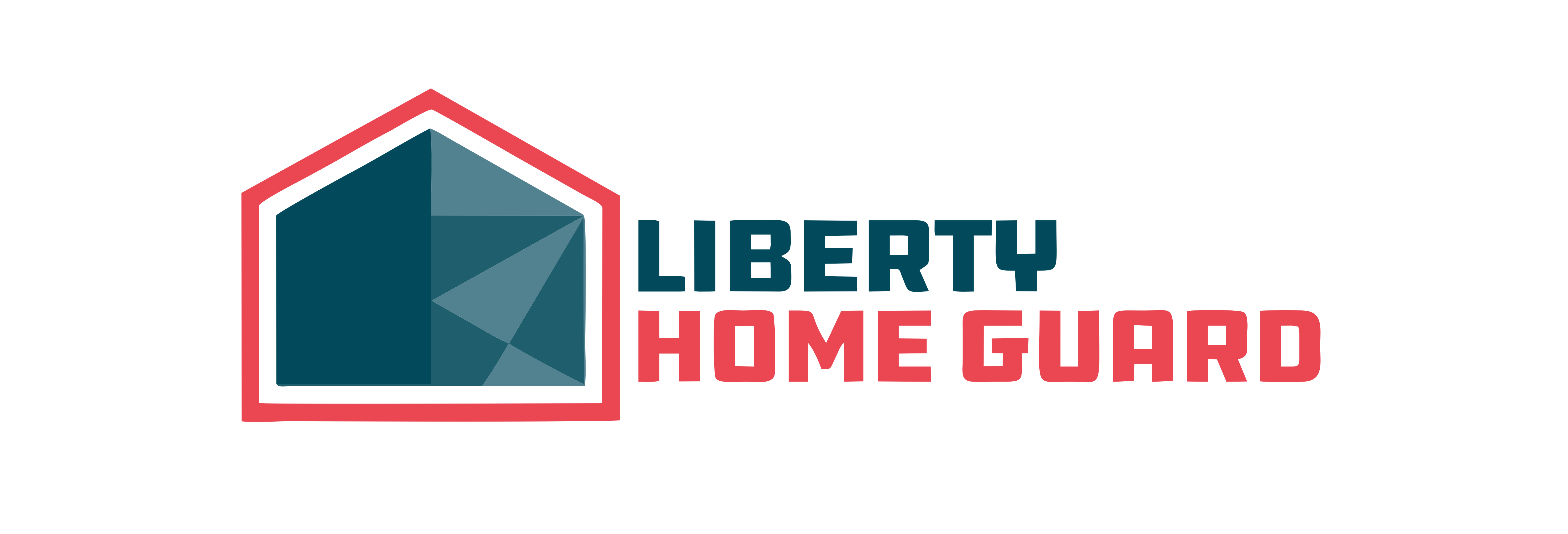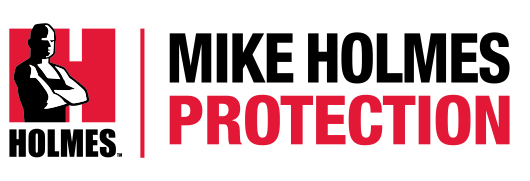 Last updated: August 19th, 2024
Last updated: August 19th, 2024
Why Is My Air Conditioner Blowing Hot Air?

As the temperatures rise and summer approaches, ensuring that your air conditioner is functioning properly becomes essential for maintaining comfort and a cool indoor environment. However, encountering problems such as your air conditioner blowing hot air can be frustrating and inconvenient.
This guide will explore why your air conditioner might be blowing hot air. By understanding the potential causes behind this frustrating problem, you’ll be better prepared to troubleshoot and resolve the issue effectively.
Reasons Why Your AC Is Blowing Hot Air
Understanding the potential causes behind this issue can help you diagnose the problem more effectively and take appropriate steps to restore your AC’s cooling functionality.

Here, we’ll explore some common reasons why your AC may be blowing hot air and suggest solutions to rectify the issue.
1. Refrigerant Leak
Refrigerant leaks can significantly impact the performance of your HVAC system. Understanding the potential causes can help address and prevent this issue effectively.
Causes
- Damage to refrigerant lines: Over time, wear and tear or physical damage can lead to leaks in the refrigerant lines.
- Faulty connections or seals: Poorly sealed or deteriorated seals can leak refrigerant.
- Wear and tear: The natural aging process of the system can cause the deterioration of components, leading to leaks.
Solutions
- Locate and repair the leak: A professional HVAC technician can use leak detection tools to identify and repair leaks in the refrigerant lines.
- Recharge the refrigerant: Once the leak is repaired, the system should be recharged with the correct amount of refrigerant.
- Seal any damaged connections or replace faulty seals: Ensure all connections are properly sealed to prevent future leaks, and replace any damaged seals as needed.
2. Dirty Air Filter
A dirty air filter can cause numerous problems for your HVAC system, affecting its efficiency and air quality. Identifying the causes can help maintain clean airflow.
Causes
- Accumulation of dust, debris, and pet hair: Over time, the air filter becomes clogged with airborne particles, restricting airflow.
- Neglected filter maintenance: Failure to regularly clean or replace the air filter allows debris to accumulate, further blocking airflow.
- Reduced airflow through the system: A dirty air filter impedes air flow, reducing its cooling efficiency.
Solutions
- Replace or clean the air filter regularly: Follow the manufacturer’s recommendations for filter replacement or cleaning intervals.
- Use high-quality filters: Choose filters with the appropriate MERV rating for your HVAC system to ensure optimal performance.
- Schedule filter maintenance: Incorporate air filter inspection and replacement into your regular maintenance routine to prevent issues.
3. Faulty Compressor
The compressor is the heart of your air conditioning system. Recognizing the potential causes of compressor failure is crucial for maintaining system functionality.
Causes
- Overheating: Inadequate lubrication or debris accumulation can cause the compressor to overheat.
- Mechanical wear and tear: Normal wear and tear can cause components within the compressor to degrade over time, leading to failure.
Solutions
- Professional diagnose and repair compressor issues: A qualified HVAC technician can troubleshoot compressor problems and perform necessary repairs.
- Ensure proper maintenance: Regular maintenance helps prolong the life of the compressor and prevents issues.
- Consider compressor replacement: Replacement may be the most cost-effective solution if the compressor is severely damaged or worn.
4. Blocked Condenser Unit
A blocked condenser unit can impede the cooling process of your HVAC system, leading to inefficiency and potential damage. Understanding the causes can help prevent blockages.
Causes
- Accumulation of dirt, leaves, or debris: Debris can obstruct airflow around the condenser unit, reducing efficiency.
- Improper placement or obstruction around the unit: If the condenser unit is located in a cramped or poorly ventilated area, it may not be able to dissipate heat effectively.
- Lack of regular maintenance: Neglecting to clean the condenser unit regularly can allow debris to build up and block airflow.
Solutions
- Clear debris around the condenser unit: Use a brush or hose to remove dirt, leaves, and other debris from the area surrounding the condenser.
- Trim vegetation and ensure proper airflow: Plants, bushes, and other obstacles should be kept at least two feet from the condenser to allow adequate airflow.
- Schedule regular maintenance to prevent blockages: Arrange annual maintenance visits from an HVAC technician to clean and inspect the condenser unit and ensure optimal performance.
5. Frozen Evaporator Coil
A frozen evaporator coil can disrupt the cooling process of your HVAC system, leading to discomfort and potential damage. Identifying the causes is essential for effectively addressing this issue.
Causes
- Restricted airflow due to dirty filters or blocked vents: A dirty air filter or blocked supply vents can restrict airflow over the evaporator coil, causing it to freeze.
- Low refrigerant levels: Insufficient refrigerant can lead to a drop in temperature inside the evaporator coil, causing moisture in the air to freeze.
- Malfunctioning components such as blower motors or thermostats: Issues with the blower motor or thermostat can disrupt airflow and temperature regulation, contributing to coil freezing.
Solutions
- Address airflow issues by replacing filters and clearing vents: To promote proper airflow, replace dirty air filters and ensure all supply vents are open and unobstructed.
- Professional inspection and repair of refrigerant levels and components: A qualified technician can identify and address refrigerant leaks or component malfunctions contributing to coil freezing.
6. Electrical Issues
Electrical issues can disrupt the operation of your HVAC system and pose safety hazards. Recognizing the potential causes is essential for ensuring system reliability and safety.
Causes
- Faulty wiring or connections: Loose or damaged electrical wiring can disrupt the flow of electricity to components, causing them to malfunction.
- Capacitor or relay failure: Capacitors and relays play crucial roles in starting and controlling electrical components in the AC system. Failure of these components can lead to electrical issues.
- Circuit breaker tripping: Overloaded circuits or short circuits can cause circuit breakers to trip, cutting off power to the AC unit.
Solutions
- Inspect wiring and connections: Check electrical connections and wiring for signs of wear or damage and repair or replace them as needed.
- Replace faulty electrical components: If capacitors or relays are faulty, replace them with a qualified technician to restore proper functionality.
- Reset circuit breakers: To prevent future issues, reset tripped circuit breakers and investigate the cause of the overload or short circuit.
Maintenance Tips For Air Conditioner Blowing Hot Air
When your air conditioner starts blowing hot air, especially during hot weather, it’s essential to take preventive measures to avoid the issue.

Here are some maintenance tips to help you keep your air conditioner running smoothly.
1. Check Thermostat Settings
- Ensure your thermostat is set to “cool” mode and the desired cool temperature is lower than the current room temperature.
- Double-check for any accidental switching to “heat” mode.
2. Inspect The Air Filter
- A clogged air filter restricts airflow and reduces cooling efficiency.
- Replace the air filter according to the manufacturer’s recommendations, typically every 1-3 months, depending on usage and dust levels.
3. Clean Outdoor Unit
- The outdoor unit releases heat, and debris buildup around the unit can hinder this process.
- Turn off the AC and remove any leaves, twigs, or dirt around the unit. Avoid using a hose directly on the unit, as it can damage electrical components.
4. Check Refrigerant Leaks
- Low refrigerant levels can significantly impact cooling.
- Look for signs of leaks, such as hissing sounds, oily residue around the refrigerant lines, or ice buildup on the coils (a sign of excessive refrigerant loss).
5. Inspect Condenser Coils
- The condenser coils in the outdoor unit release heat from the refrigerant.
- Dirt and grime on the coils can reduce heat transfer. You can gently clean the coils with a soft brush and water, but be careful not to bend the fins.
- For heavily clogged coils, calling a professional for cleaning is recommended.
6. Verify Proper Airflow
- Ensure vents throughout your house are open and not blocked by furniture or rugs.
- Check for any closed return vents that might be restricting cool air circulation.
7. Inspect Ductwork
- Damaged or leaky ducts can reduce airflow and cooling efficiency.
- Look for any visible cracks or disconnected ducts in your basement or crawlspace. Minor tears in ductwork may be repairable with duct tape, but it’s best to consult an HVAC professional for extensive repairs.
8. Schedule Professional Maintenance
- Regularly scheduled maintenance by an HVAC technician can help prevent future problems and ensure your air conditioner runs efficiently.
- Professionals can diagnose and fix complex issues, thoroughly clean, and recharge the refrigerant levels if needed.
Home Warranty Plans For Air Conditioner
Investing in a home warranty plan for your air conditioner offers coverage for essential components of your AC system, ensuring you’re prepared for potential breakdowns or malfunctions.
Top Home Warranty Companies Covering Air Conditioner
Here are three top home warranty companies that provide coverage for the faulty parts of air conditioners.
Premium
$29 - $89
Deductible
$100 & $125
Coverage Limit
$4K - $5K
Why We Picked It
All components and parts of the following air conditioning systems: ducted, central, electric, split, and package units, geothermal, wall air conditioners, and mini-splits.
$50 off + 1 Month Free
Premium
$46 - $55
Deductible
$75 - $125
Coverage Limit
Upto $3K/item
Why We Picked It
Comprehensive air conditioning systems coverage includes ducted, central, electric, split, and package units, geothermal units, evaporative coolers, wall air conditioners, and mini-splits.
$150 off + Free roof coverage + 2 months free
Premium
$44 - $47
Deductible
$60 - $75
Coverage Limit
$3K/Item
Why We Picked It
Covers labor and parts for major components of air conditioning systems, including Condenser fan motors, compressors, condensers, thermostats, capacitors, relays, contactors, pressure switches, thermistors, cut-in switches, transformers, Start Assist, defrost boards, and blower motors.
Let’s explore what typically gets covered under these plans and some potential exclusions to consider.
What Gets Covered
- Labor and Parts: Coverage typically extends to the cost of parts and labor required to repair or replace covered components.
- Ducted Central Electric Split and Package Units: These systems consist of an outdoor condenser unit and an indoor air handler or furnace connected by ductwork throughout the home.
- Geothermal Units: Geothermal heat pumps use the earth’s natural heat to provide heating, cooling, and hot water for residential and commercial buildings.
- Evaporative Coolers: Also known as swamp coolers, these systems cool air by evaporating water and blowing it into the home.
- Wall Air Conditioners: Wall-mounted units that provide localized cooling for individual rooms or small spaces.
- Mini-Splits: Ductless mini-split systems consist of an outdoor condenser unit and one or more indoor air-handling units, allowing for zone cooling without ductwork.
What Might Not Be Covered
- Pre-existing Conditions: Issues or malfunctions existing before the start of the home warranty coverage period may not be covered, so it’s crucial to ensure your AC is in good condition before purchasing a plan.
- Lack of Maintenance: Damage resulting from inadequate maintenance, neglect, or failure to perform routine upkeep on the air conditioning system may not be covered. Regular maintenance is essential to keep your AC in optimal condition and maintain coverage eligibility.
- Cosmetic Damage: Cosmetic issues or superficial damage that doesn’t affect the air conditioner’s functionality, such as scratches or dents, may not be covered under the home warranty plan.
- Upgrades or Modifications: Any upgrades, modifications, or enhancements made to the air conditioning system beyond its original specifications may not be covered. It’s essential to consult your home warranty provider before making any changes to your HVAC system.
It’s essential to carefully review the terms and conditions of your home warranty plan to understand precisely what is covered and what might not be covered. Additionally, exclusions and limitations may vary between providers and plan options, so clarifying any uncertainties with your home warranty provider is crucial.
Final Word
With the arrival of summer, ensuring your air conditioner is in optimal condition becomes paramount for maintaining comfort indoors. Dealing with issues like your AC blowing hot air can be frustrating, but understanding the potential causes and solutions outlined in this guide empowers you to address the problem effectively.
Investing in a home warranty plan for your air conditioner provides valuable coverage for essential components and offers financial protection against unexpected repair costs. However, it's crucial to carefully review your plan's coverage details, exclusions, and limitations to ensure you're adequately protected.
related articles
 Discover First American Home Warranty Locations and What You Need to Know About Their Cover.
Discover First American Home Warranty Locations and What You Need to Know About Their Cover.
 Reviews of Home Warranty Companies Show You How to Determine If Your Home Is Covered
Reviews of Home Warranty Companies Show You How to Determine If Your Home Is Covered













